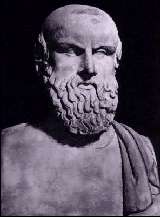
Born: Circa 525-524 B.C., in Eleusis, Attica
Died: Circa 456-455 B.C., in Gela, Sicily
Aeschylus, the son of a land owner in Eleusis, is called the father of Greek tragedy. He was the predecessor to Sophocles and Euripides. Aeschylus was both a writer and a warrior. He wrote approximately ninety plays, of which seven have been preserved. He is most noted for his tragedies, which were performed in Sicily for Hiero, king of Syracuse. He also fought in the battle of Marathon in 490 B.C. and at Salamis in 480 B.C.
His plays were usually performed at the festival in Athens to celebrate Dionysus. Because the plays evolved from songs sung to the gods, the nature of the drama was usually a tale of heroism or a celebration of a historic event. For example, Women of Aetna was produced to commemorate the re-founding of Aetna, which had been destroyed in a volcanic eruption in 475 B.C. The plays would begin with one actor speaking or singing the narrative, after which a chorus of approximately fifty people would continue the story.
At the festival, prizes were awarded for a set of plays or verses. Three pieces grouped together under a common theme were called a trilogy. Aeschylus' greatest work and the only surviving trilogy, was Oresteia. The trilogy comprises Agamemnon, The Liberation Bearers, and The Eumenides. The themes of the trilogy include his concepts of justice and mercy, his belief in the divine will, and his belief that humanity can achieve wisdom through suffering and divine will.
Although Aeschylus first entered the competition around 499 B.C., he didn't win until 484 B.C. His entry into the event changed the way the tragedy was performed. First, he reduced the numbers in the chorus to about twelve from fifty. Then, he added a second actor, which was an important step in developing dramatic dialogue. He also introduced elements of costume and scenery.